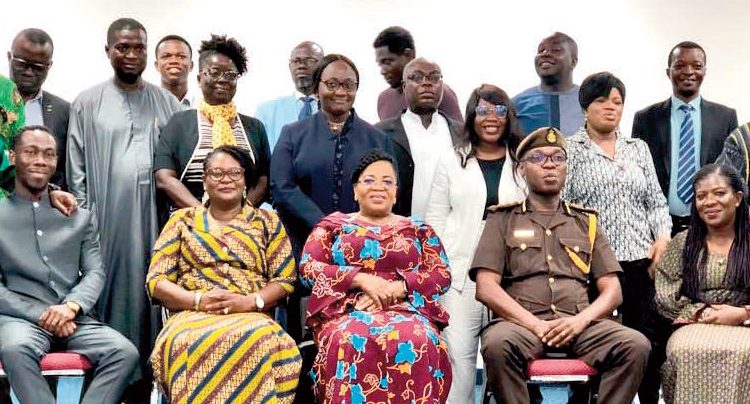Participants at the one-day validation workshop on the final draft of the Community Service Bill
Plans are far advanced for the introduction of non-custodial sentencing into Ghana’s criminal justice system as part of moves to decrease population in the country’s heavily congested prisons.
Stakeholders at a day’s validation workshop on the final draft of the Community Service Bill which started as far back as 2014, all reiterated the need for the bill to reduce the prisoner population while improving on the health conditions of those incarcerated.
Community Service is an alternative punishment to custodial sentencing where a court convicts an accused person of a minor offence to undertake unpaid community service for a period of time.
Minister for the Interior, Ambrose Derry, in a speech read for him by Doreen Annan, Director of Finance at the Ministry, indicated that the issue of non-custodial sentencing is one of the key deliverables of the ministry which it is committed to implementing.
He said the overcrowding of Ghana’s prisons constitutes a significant problem that confronts our criminal justice system, presenting challenges such as infringement on the rights of prisoners, the spread of communicable diseases, recidivism and stigmatisation.
To ensure that there is safe custody, reformation and rehabilitation of convicts, he said the Ministry of the Interior in partnership with MDAs, MMDAs, CSOs, UN agencies, developmental agencies, and others has initiated several policies and programmes, including the development of regulations to introduce parole system by the Ghana Prisons Service and the amendment of the Ghana Prisons Service Act to meet international standards.
Other initiatives are the passage of the Narcotics Control Commission Act 2020 (Act 1019) to decriminalise the use of narcotic substances, and has addressed its use as medical or psychological conditions as well as the introduction of plea bargaining into the Criminal Procedure Act, 1960 (Act 30).
“These measures being put in place is to address the congestion in prisons, improve conditions of detention, reduce the occurrence of recidivism as well as promote the reintegration and resettlement of offenders back into community life,” Mr. Derry noted.
He stated that Community Service will allow offenders to contribute to society by performing a kind of service in various sectors of the economy in the community/country, adding that offenders also stand a little or no risk of losing their livelihood/income and maintains the family system.
Mr. Derry added that the Ministry of the Interior and the Office of the Attorney General and Ministry of Justice would submit a Joint Memo to Cabinet for approval and then to Parliament for further action.
The Chief Director at the Office of the Head of the Local Government Service, Felicia Dapaah, said the inherited criminal justice system has contributed to the overdependence on imprisonment as a way of punishment.
She said the Community Service Bill, when passed into law, will address the over-reliance on custodial sentences in Ghana.
“This bill, when passed into law, will assist in reducing the financial burden on the Government and the money saved could be channeled into other productive sectors of the economy,” Ms. Dapaah added.
Jonathan Osei Owusu, the Executive Director of POS Foundation, facilitators of the Justice For All Programme and a key stakeholder in the drafting of the bill, indicated that the implementation of the initiative will not create any bureaucratic system but would rather depend on existing local government structures, thereby reducing the cost of implementation.
He added that the activity of the Foundation and the Ministry of the Interior was sponsored by the Open Society Foundation (OSF), DANIDA and UNICEF, while the one-day consultative workshop was sponsored by Open Society Initiative for West Africa (OSIWA).
BY Gibril Abdul Razak


